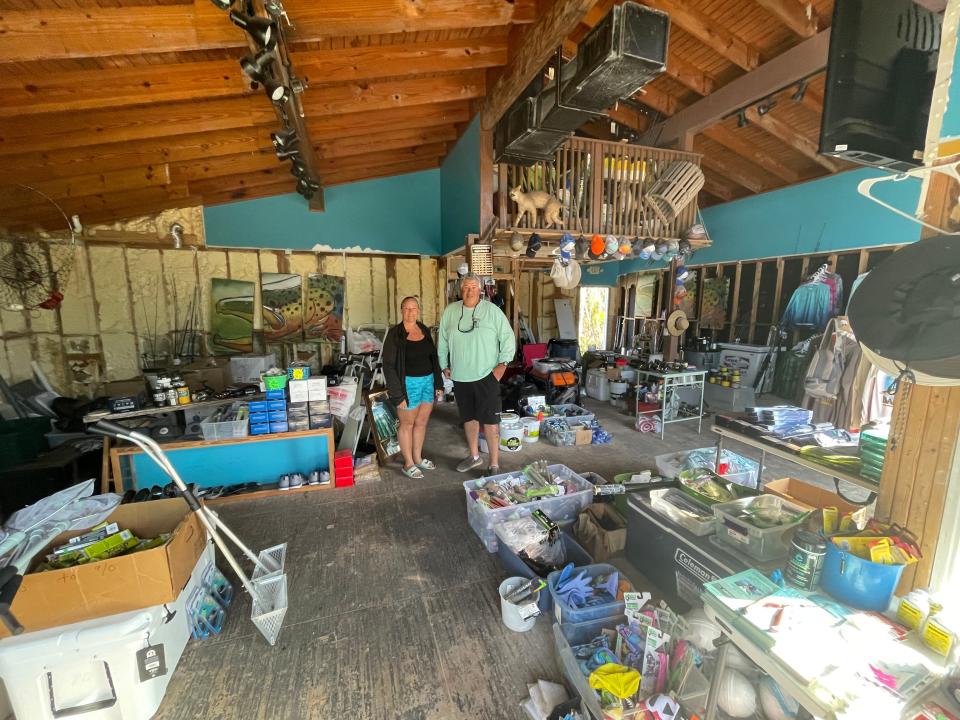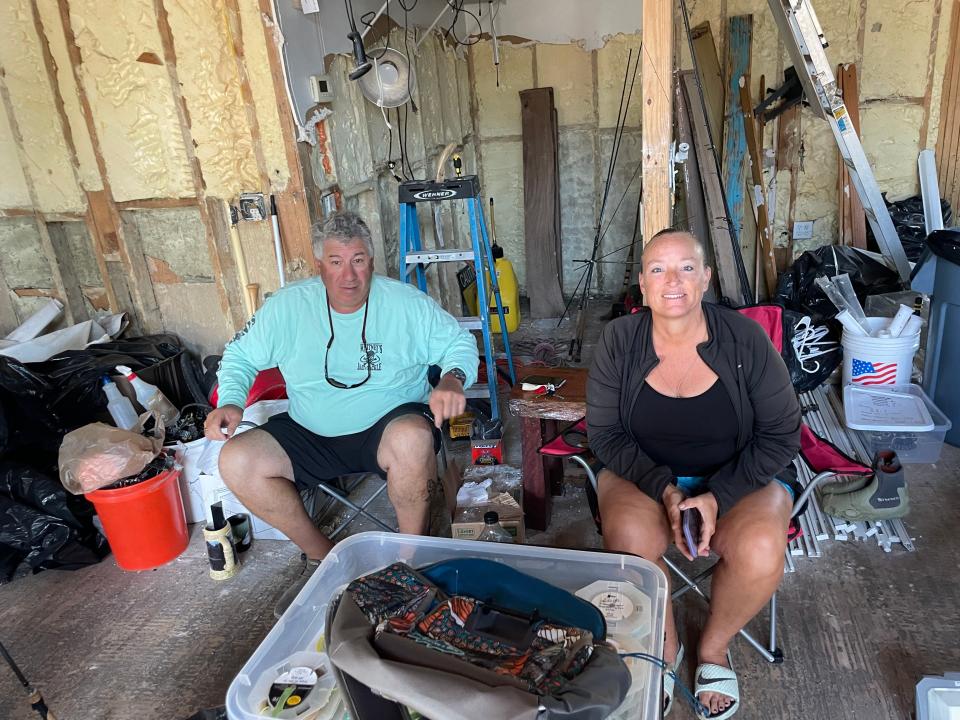I took a break from spring training in SWFL and found resilience where Hurricane Ian hit
- Oops!Something went wrong.Please try again later.
SANIBEL ISLAND — Five months after Hurricane Ian destroyed this island paradise, piles of debris still line the roads. They look like dirty, evil snowbanks — stacks of moldy wood and chunks of concrete and shattered dream houses.
The destruction is gut-wrenching. Most businesses are still closed. Many roads still deserted. Homes are destroyed or condemned. Roofs still missing. Windows still shattered. Trees down.
The sheer magnitude of devastation and suffering — everywhere you turn, really — is sobering and shocking.
But I found a sliver of hope inside Whitney’s Bait and Tackle.
“Yes, we’re open," a sign says defiantly.
Take that and shove it straight up your hurricane eye, Mother Nature!
A sheet of plywood is propped against the railing. A message left in spray paint: “Still a Fisherman’s Paradise.”
“We don't give up,” Christine Heffern said.
“Never give up,” said Jim Bryan.
I met Heffern and Bryan on Sunday morning before the Detroit Tigers played the Minnesota Twins in Fort Myers. They were sitting together in the store, waiting for customers, working to keep this bait shop open.
Tourism after Hurricane Ian: Lee County needs a tourism spending boost. Can spring training deliver?
Behind the scenes at spring training: Cape Coral residents a hit off the field during Red Sox, Twins spring training

Technically, I’m in Florida to cover spring training and write about the Detroit Tigers. But this seemed far more important to offer a report from where the hurricane did so much damage.
Because Florida is so important to many Michiganders. For so many of us, Florida is where we go on vacation. Where we visit our grandparents when we are kids. Where we go on spring break when we are in college. Where we visit our parents after they become snowbirds. And eventually, where we go to retire, just like them. If we are lucky.
Yes, spring training is happening in Florida. Just like always.
But at the same time, so is this: trucks are rumbling down the road on Sanibel Island and workers are picking up debris; and the whole island looks like a giant construction site; and people are climbing on their roofs to fix blue tarps; and people are still displaced, still living out of suitcases.
Hurricane Ian hit this island on Sept. 28 — the fourth-strongest hurricane to ever hit Florida.
But this bait shop is still standing.
“We never closed,” Heffern says.
The before and after
But everything has changed. They had to tear out the walls and rip out the flooring because of mold. They had to wash the seawater out of the clothing merchandise, just to get it to the point where they could sell it at reduced rates.
And they had to run an electric cord from a temporary post, just to run the bait tank and freezer.
“Just to stay open,” Bryan says. “Just to stay in business. We are the only bait shop to stay open."
Life, on this island, is marked by two distinct passages in time.
Before the hurricane and after.
“Before the hurricane, this whole area was lots of greenery,” Heffern says. “It was totally green.”
After the hurricane, everything seemed to die — all color vanished.
“It was completely brown, the whole island,” she said.
“The very next day, you couldn't even walk down the street,” Bryan said.
“You couldn't drive,” she said.
“There was just so much debris — houses and buildings,” he said.

Trucks were washed away. Boats lost. Cottages swept away.
Lives lost. Nature turned upside down.
“There was an alligator across the street in the water, probably a 10- or 12-footer,” she said.
Yes, they stayed open.
And they plan to rebuild. They have a contractor lined up. Just waiting on permitting.
“Everybody said from the beginning, it's a marathon not a sprint,” she said. “So we're all being taught a lot of patience.”
Tigers manager offers perspective
I check my watch, afraid I’m going to be late for the game.
I drive about 15 miles from Sanibel Island to Hammond Stadium in Fort Myers, where the Tigers and Twins are preparing for their exhibition game.
Tigers manager A.J. Hinch holds his usual pregame media session in the dugout.
At the end, we start talking about hurricanes.
“I’m staying at a house with a blue tarp on the roof,” I tell him.
The roof was damaged in the hurricane. The house is being rented by friends from Traverse City and it’s owned by somebody from Traverse. This hurricane seemed to touch everybody in different ways. Even people from Michigan.
"The devastation that comes with a hurricane cannot be overstated,” Hinch said.
6 things to know: First, Red Sox fans. Now, New England chains are joining them in SWFL
More baseball news: Minor league baseball players in Florida could be paid below minimum wage under proposed bill
He was managing the Houston Astros in 2017 when Hurricane Harvey devastated large swaths of Texas and Louisiana.
“When you see (hurricane damage) up close and personal, it's unlike any devastation that you've ever seen before,” Hinch said. “Yes, there are house fires; and yes, there are floods. When you combine all of that into one massive destruction, the resolve of people is the only thing that gets you back to normal. If it's ever normal again, your new normal has to be restarting over.”
He starts to reminisce, telling stories about seeing the devastation from an airplane.
“It was incredible what we saw, and we landed and they had to divert us to our homes,” he said.
Normally, the drive to his house would take 30 minutes but it took two hours.
“All the exits were filled with water,” he said. “I'm talking about 10 feet.”
On that day, the Tigers traded Justin Verlander to Houston.
“During that drive,” Hinch said.
More memories came back to him.
“The Mets allowed us to cancel the game and do a day of service,” Hinch said. “So all of our players were out in the community. My kids and I and my wife and a couple players and their families were at the convention center packing Target bags and Walmart bags with socks and toiletries.”
When the Astros played their first game back in Houston, Hinch was asked to speak to the crowd.
“The most nervous I've ever been as a manager,” he said. “Because you can't mess that up.”
Hinch is an amazing public speaker. His ability to communicate is off the charts.
But this rattled him.
“Hello Houston, it’s good to be home,” Hinch told the crowd. “A very special day for us to start the rebuilding process of our great city. To the first responders, those that are here, that aren't here, we can't say thank you enough. On behalf of the players, coaches, our organization, we want to thank everyone in the city Houston that is doing something good for somebody else. We're very fortunate to survive this hurricane. For those, who didn’t, our thoughts and prayers with your families."
The Astros wore patches on their jerseys with the word “STRONG” in block letters as a tribute.
“We wear this patch on our jersey the rest of the season to represent all of you,” Hinch said. “Stay strong. Be strong, and we appreciate every one of you.”
Lessons that linger
Late Sunday night, the thoughts and images from Sanibel Island kept coming back to me.
Not just the devastation.
But the spirit of resilience.
Now, this island looks like one giant construction site. There is a steady stream of trucks and the workers cleaning up debris.
People are starting to ride their bikes again.
Just like Hinch told Houston: Stay strong. Be strong.
“We have five or six restaurants open for business and they're packed every day,” Bryan told me.
But one thing stuck with me.
The tops of the palm trees are turning green.
In the midst of all that brown, high above the piles of debris, there are signs of growth.
Rebirth and resilience.
Everything is trying to come back to life.
Even the palm trees.
Contact Jeff Seidel at jseidel@freepress.com or follow him on Twitter @seideljeff.
This article originally appeared on Fort Myers News-Press: Spring training after Hurricane Ian: Resilience found in SWFL

